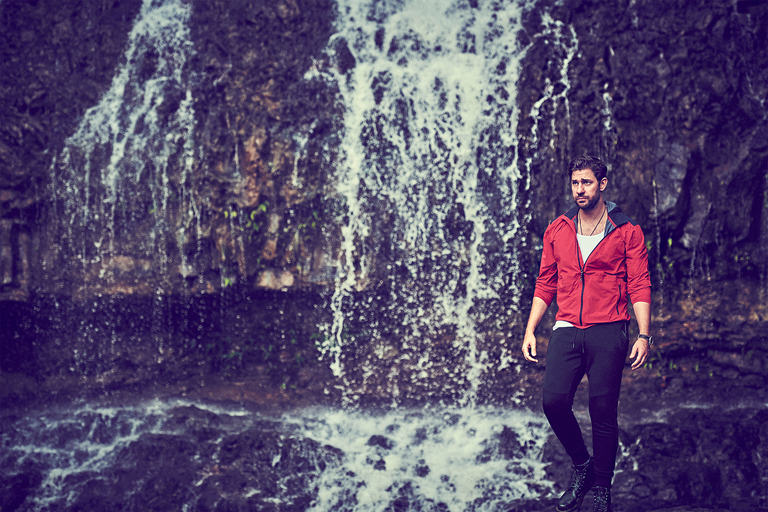
Back in 2016, writer-actor-director John Krasinski and his wife, actress Emily Blunt, sold their place in the Hollywood Hills—to Kendall Jenner, as it happens—and moved to a townhouse in Brooklyn, next to Prospect Park. These days, when work brings him back to L. A., Krasinski stays just a few blocks down the hill from his old neighborhood, at the Chateau Marmont hotel. This is where we find him on a Monday in June, high above Sunset Boulevard in suite 69, barefoot and bearded, still reeling from two of the wildest months of his life.
Krasinski, 38, is something of a Chateau buff. He and Aaron Sorkin have been talking for years about making a show about the hotel—something big and complicated, with story lines spanning the place’s nine-decade history, an epic worthy of a building with a Hollywood legend attached to every room. Suite 69 is famous for two reasons: It’s where Stephen Dorff lived while filming Sofia Coppola’s Somewhere, about an actor undergoing a low-key existential crisis while staying in room 59, one floor below. It’s also where Jim Morrison stayed the night he attempted to exit his room by shinnying down a drainpipe, fell several stories, and survived by bouncing off a shed. “That’s amazing,” Krasinski says when informed of his room’s place in Doors lore. He immediately steps out onto the balcony to check out the drop. The view is vertiginous. The infamous drainpipe seems to have been removed, perhaps to discourage stunts by copycat Lizard Kings—which doesn’t stop Krasinski from leaning a little too far over the edge to look for it. “It would be great if I plunged to my death while trying to figure this out,” he says with a grin.
Krasinski steps back inside, kills the air-conditioning, and leaves the balcony doors open to let the breeze cool down the room. “I hear this is how Stephen Dorff used to do it,” he says. He calls room service, orders a pot of coffee, and folds his six-foot-three frame into an armchair. It’s four o’clock in the afternoon; a long day of calls and meetings is coming to a close.
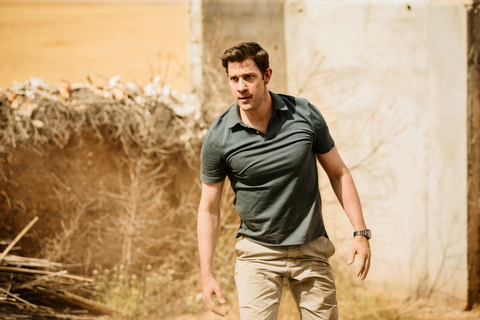
Jan Thijs/Potomac River Productions Inc. 2017/Amazon
As of our conversation, Krasinski has finished shooting the first season of Jack Ryan for Amazon (available to stream August 31). He plays the title role, stepping into a part made famous by Alec Baldwin and Harrison Ford and subsequently rebooted, with diminishing returns, by Ben Affleck and Chris Pine; Amazon pitched it to Krasinski by suggesting that serialized TV might be a better medium for the sprawl of Tom Clancy’s books. (The response at screenings was so positive that Amazon has already ordered a second season.)
Plus, he has always had an affinity for the character: “I remember feeling really connected to him because he seemed like a regular person who by his own volition became heroic.” Krasinski’s Ryan is a low-level modern-day CIA drone—the human, cubicle-bound kind—who gets pulled into the line of fire after picking up the trail of a terrorist he’s convinced is the next Osama bin Laden. It’s the perfect part for the actor he has become since The Office—a Jim Halpert whose buttoned-up exterior conceals a core of reluctant-action-hero steel.
But when we meet at the Chateau, the public has not seen the show yet. If the phone is ringing more insistently, it’s largely due to the surprise box-office success of Krasinski’s film A Quiet Place, in which he and Blunt star as harried postapocalyptic parents trying to protect their kids from extraterrestrial monsters who hunt by sound. Shot for a paltry $17 million and—it has to be said—directed by a guy still best known for playing nice-guy paper salesman Jim, A Quiet Place unexpectedly raked in $50 million during its opening weekend, unseating Ready Player One, helmed by a slightly more established auteur named Steven Spielberg. By early June, the movie had already made more than $300 million worldwide.
These are career-altering, life-changing developments for a guy in Krasinski’s position. But what he’s really grateful for, he says, is that during opening weekend and the days after, he was at home in New York, in his own headspace, hanging out with his wife and kids instead of breathing the industry’s hot air. “It was awesome,” he says, “because I don’t know if I trust myself to have processed it properly if I was out here. It was nice to have a week of nothing but introspection.”
I remember feeling really connected to him because he seemed like a regular person who by his own volition became heroic.”
That Monday, he and Blunt were walking home after dropping off their older daughter, Hazel, at school. Then, Krasinski says, “in true New York fashion, a garbage truck rips around the corner, screeches up to these cans, and the guy jumps off the back. He grabs a trash can, goes to the back of the truck, sees me, goes, ‘Saw it Sunday. Fucking awesome’—without making eye contact—dumps the can, and keeps going. Emily turned to me and we high-fived,” he says. “She was like, ‘That’s the coolest review you’re going to get.’ ”
In a sense, A Quiet Place is really a movie about parental love and sacrifice that happens to include a few monsters; it’s the kind of film only someone who looks up to his father could have made. Accordingly, when asked to name a hero outside his own profession, Krasinski doesn’t hesitate: Dad. “My mom, too,” he quickly adds. “But as far as being a man—if I can be a quarter of the person my dad is, when I perish from this earth, I would feel like I’d achieved something.”
Krasinski’s father, Ronald, was a general practitioner; his mother, Mary, was a nurse. He grew up in Newton, Massachusetts; served as an altar boy until he was 18; and played high school basketball just like his two older brothers. They were good; he was okay. He arrived at Brown University thinking he’d play ball there; that idea evaporated once he showed up to a practice and glimpsed his would-be teammates. “I remember the [gym] door opened,” he says, “and as it shut, I was like, ‘No.’ It wasn’t only how good and how big they were—you could see the commitment. You could see that this was their second practice in a day and they woke up at 4:30 for morning lifts. I’m like, ‘This is not my college experience. I can’t do this.’
“And I know this sounds convenient,” he says, “but that same day, I’m walking back from the gym, now looking for a group to be part of, and there’s a leaflet on a tree. I’ll never forget this, because at Brown that’s a big no-no, to put a nail in a tree.”
The leaflet turned out to be a recruitment flyer for a sketch-comedy group. Thus did a preppy-looking Newton kid who’d just come from basketball practice fall in with a crew Krasinski describes as “the coolest alt kids you’ll ever meet,” kids who turned him on to Nick Drake, Noah Baumbach, and countless other artists who would blow his world open.
Maybe you’ve heard him tell this story before. The role he took in a staged reading of David Foster Wallace’s Brief Interviews with Hideous Men— directed by future MSNBC host Chris Hayes—that convinced him there might be more to acting than making people laugh. (Krasinski directed a low-budget movie based on Wallace’s book in 2009; reviews at the time were mixed, but it plays today like a prescient meditation on the theme of toxic masculinity.) The stint at theater school after Brown, and the promise he made to his parents when he moved to New York to be an actor—that if he hadn’t made it within three years, he’d try to be something else. When those years were almost up, he called his mom, who encouraged him to hang in there; three weeks later, he booked The Office.
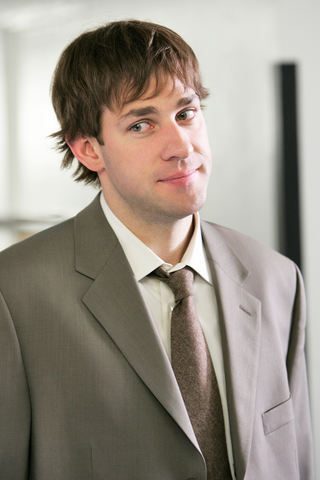
No one expected the American version of Ricky Gervais’s British sitcom to succeed when it premiered in 2005. But after an awkward first episode—essentially a word-for-word restaging of the original pilot—the show began to cohere, in part by building stories around its superb supporting cast. Audiences became deeply invested in the slow-burning romance between Jim and receptionist Pam Beesly (Jenna Fischer).
The final U. S. Office episode aired in 2013, but Jim Halpert has enjoyed a second life on the Internet, where GIFs of Krasinski’s classic reaction shots have become social-media shorthand for joy, horror, confusion, and dismay. Krasinski insists—believably—that he’s okay with being a human emoji. He thinks it’s fantastic, in fact. And while he’s made some moves over the years that could be read as attempts to distance himself from the prank-loving cubicle jockey he played on TV for nine seasons—stepping in to deliver one of the nastiest monologues in Brief Interviews himself, for example, or getting ripped for Michael Bay’s 13 Hours—he says that wasn’t really the plan.
“None of those things were about running away from Jim,” he says. “Jim is one of those things that, I know, at the end of my career, I’ll still be most known for. And that’s awesome. That’s an honor. But I wanted to try different things. I wanted to set myself up to explore things that were scary, and things I wasn’t sure I was going to be good at.”
This being Men’s Health, let’s talk about the abs, just for a second. There’s a shot in 13 Hours in which Krasinski walks out onto a Benghazi porch. His shirt is off, his core resembles a narrow cobblestone street. He’s already talked to MH about how he did it. (See: “Jack(ed) Ryan,” below.) I ask him if he can articulate what the transformation did for him, both career-wise and psychologically.
“Someone in the Marvel world or the leading-man world said to me, ‘Hollywood can’t imagine you doing it until you do it. And once they see it, it can’t be unseen by them.’ And that’s exactly what happened to me,” Krasinski says. “When I went out for Captain America, people were like, ‘Really?’ Then I did 13 Hours, and people are like, ‘Okay, yeah, you can do these roles now.’ I’m like, ‘You don’t care about the acting? You just care about the physical shape?’ And they’re like, ‘Correct.’ “Not to get into the whole regime,” he continues, “but on 13 Hours, I did it for the role, and then I definitely got addicted to it. I take periods off. I remember my trainer saying, ‘Try to stay within three weeks, so that whatever part you get, within three weeks we can get you down.’ That’s the goal, to be able to shift back and forth. I think that’s better than saying, ‘Stay ripped your whole life.’ Because that’s really annoying, and the people who do it really easily annoy me. Yes, I’m talking to you, Chris Hemsworth.
“I think mentally, it’s cleared my head for things like directing and producing,” he says. “Staying really busy. If I didn’t work out a few times a week, I would start to overanalyze. It definitely takes me out of myself for a minute. And it gives me my best ideas. Your brain definitely works better when it’s all lubed up with endorphins and sweat and blood.”
‘Hollywood can’t imagine you doing it until you do it. And once they see it, it can’t be unseen by them. And that’s exactly what happened to me.”
He came close to being Captain America, for the record. “Yes, I put on the suit. Yes, I did the screen test. But I knew they’d offered it to Chris [Evans] like four times, and eventually I got the call. ‘Chris is engaging.’ And I was like, ‘Of course he is! Look at that dude. He is Captain America!’ It’s the way I was brought up—I’ve always been a realist and I respect the situation. You can’t fight against things you can’t control. I remember we were on our way to a party for Emily’s birthday when I found out. I hung up the phone and [told her], ‘Yeah, it’s not me.’ She was like, ‘Do you want to cancel?’ And I said, ‘No, let’s go.’ ”
He was happy the role went to a fellow “Boston guy”—Evans grew up in Sudbury, across I-90 from Newton—and, although he doesn’t say it, he seems cool with not having spent the past seven years making superhero movies. I’m also unable to get him to concede that it was hard to watch as Casey Affleck won an Oscar for Manchester by the Sea—based on a story Krasinski came up with and initially developed for himself to star in. Again: At least a Boston guy got it.
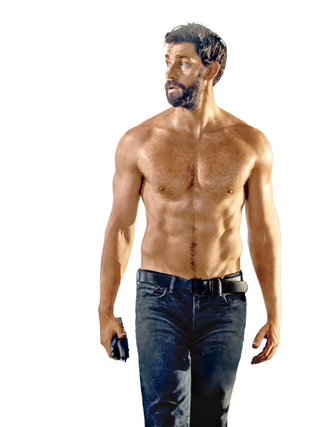
Christian Black/©Paramount Pictures/Everett Collection
More than once over the course of our conversation, Krasinski alludes to a “dark hole” he might have fallen into in response to a setback, or a success, if not for his upbringing, his wife and kids, and certain tough or fortuitous breaks that came along later in life, when he was ready to deal with them. But when I ask him to explain the hole, and whether he’s consciously putting in work to stay out of it, he admits he’s not really sure what a dark hole would consist of.
“I was too boring and clean of a kid,” he says. “I never got into a lot of trouble. Drugs and alcohol, all that stuff. I was never a big partyer. I’m more of a wine-party type. If someone brought out some cheese and wine, I’d be here until 2:00 A.M. I love talking.”
Near the end of the interview Krasinski tells me a story about Philip Seymour Hoffman. They were both in David Mamet’s State and Main. Hoffman was one of the leads, and Krasinski, who was still in college, made an uncredited appearance as a caddie. But they were in a few scenes together and got to know each other a little. Cut to a year later. Krasinski has booked The Office but he’s only just shot the pilot. He goes to see Hoffman in Eugene O’Neill’s Long Day’s Journey into Night on Broadway. As Hoffman’s character, Jamie, delivers his final monologue, confessing his love and envy for his brother, Krasinski cries—hard. “I’m weeping so much I thought he would hear me onstage,” he admits.
When the show is over, Krasinski’s buddies pressure him to go say hello to Hoffman and, reluctantly, he goes. “I was still very volatile emotionally,” he says, “and I went up, and he’s like, ‘John?’ And I almost started crying again. He’s like, ‘Are you still acting?’ And I’m like, ‘Yeah, I just got this thing called The Office,’ and he was like, ‘That’s awesome, man. I’m so glad you’re still acting.’ I’ll never forget that he had that level of care and dedication.”
He tears up a little just telling this story. This is who he is. He cries at the drop of a hat, at the memory of the drop of a hat. And yet the fact that Krasinski, with his Soft Batch heart, ended up directing a blockbuster horror movie isn’t actually as counterintuitive as it seems. When he was handed the original spec script for A Quiet Place—which came to him via producers Andrew Form and Brad Fuller, who also executive- produced Jack Ryan—his younger daughter, Violet, was about three weeks old.
“I was wide-open emotionally,” he says. “ The version I read had a lot of the standard elements of a horror movie, but I thought there was an opportunity to go deeper with the theme of parenthood. That’s when I decided to rewrite it—because I could write about my experience right then, the protective mode I was in with my kid.”
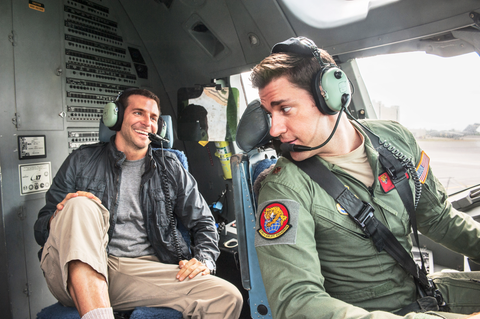
©Columbia Pictures/Courtesy Everett Collection
There’s a famous anecdote about Dustin Hoffman emerging from a screening of The Graduate and encountering an older woman in the lobby who tells him, prophetically, “Life is never going to be the same for you from this moment on.” I ask Krasinski if —despite what he’d achieved in film and television up to that point—the reception to A Quiet Place felt like a similarly huge existential shift.
“Yeah, kind of,” he says. “The difference is that I definitely don’t trust that I would be the most mentally stable person if this had happened to me at 27. The fact that I’ve had a career and have had successes and failures that have reshaped the bent metal that is life—that experience grounds me and helps me understand the goods and the bads and the dark corners and all that. But more importantly, I know I’ll never do another movie that’s this successful, this original, this underdog-y, and then on top of it have it be with my wife every step of the way.
“I said to Emily, ‘There’s no greater gift that the universe could have given me than to go through the biggest success of my career and I don’t have to explain to you how it felt.’ We were both in the boat. I said to her, ‘I don’t know if it can ever be like this again.’
“And—again, leave it to Emily, who is better at everything than me—she goes, ‘It can’t.’ She just so perfectly encapsulated it. ‘It can’t be like this again, and it shouldn’t. So take this and put it on a mantel, this really special treasure that we experienced together. And now go out and do something else.’ ”
Alex Pappademas has written about pop culture for Esquire, GQ, Grantland, and others.
A version of this story appears in the September 2018 issue of Men’s Health.
Source: Read Full Article
